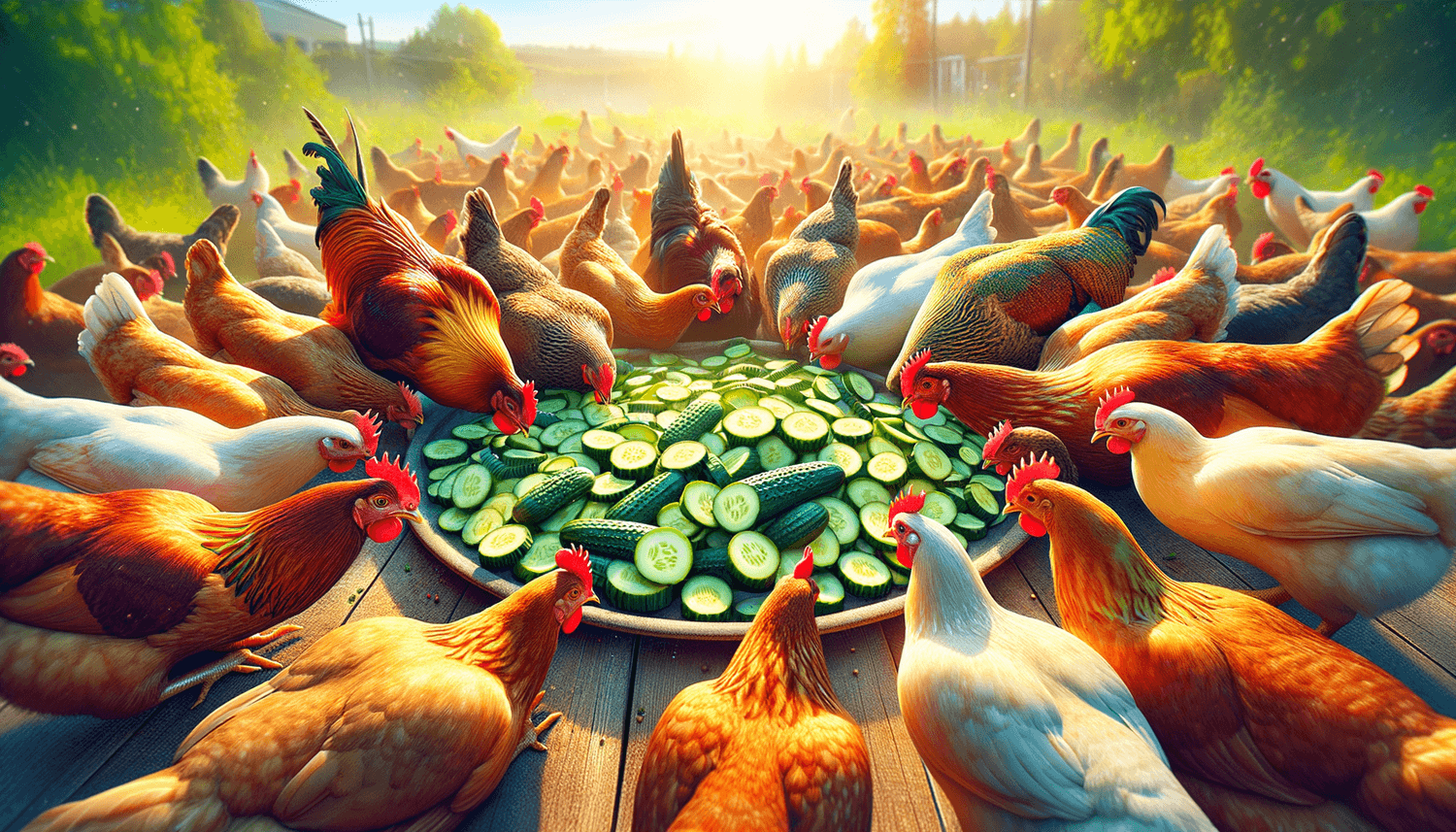Hey there, backyard chicken enthusiasts! Do your feathery friends give you ‘the look’ when you’re munching on a refreshing cucumber? Can’t help but wonder if they can share in the crunchy delight with you? Well, wonder no more, as we dive into the world of chickens and cucumber peels! In this fun-filled blog post, we’ll explore whether or not chickens can eat cucumber peels, the importance of a well-balanced diet, any potential benefits or risks, the nutritional value they’re packing, and how to serve up these scrumptious green ribbons for your clucky companions. So tuck in and get ready for a crunchy adventure in backyard chicken nutrition!
Can chickens eat cucumber peel?
Yes, chickens can safely eat cucumber peel! Cucumber peels are not only safe for your feathery friends, but they also provide hydration and essential nutrients. So, go ahead and share those refreshing cucumber peels with your backyard chickens and keep them happy and healthy!
A balanced diet for happy hens
Just like us humans, chickens need a well-balanced diet to maintain their overall health and well-being. A chicken’s diet plays a significant role in their growth, egg production, and overall happiness. And the key to keeping your backyard chickens thriving is to strike the right balance between their main meals and delicious treats.
A high-quality chicken feed should be the primary component of your chickens’ diet, making up around 80-90% of what they eat. Chicken feed is formulated to provide all the essential nutrients your feathery friends need to stay in tip-top shape. The remaining 10-20% of their diet can be made up of treats like fruits and vegetables, which not only add variety to their meals but also supply extra vitamins and minerals. So, while cucumber peels and other treats are fantastic for your chickens, make sure they’re consuming an appropriate amount of chicken feed to ensure optimal health and happiness.
Nutritional value of cucumber peel for chickens.
Feeding cucumber peels to chickens offers some valuable nutritional benefits. Cucumbers are packed with vitamins, minerals, and have a high water content, making them an excellent hydrating treat for your backyard buddies. However, it’s important to remember that cucumbers should never make up the main part of their diet, as they do not provide enough protein, fats, or other essential nutrients in large quantities.
When considering the nutritional value of cucumber peels, they are a good source of vitamins such as vitamin C, K, and various B vitamins. These vitamins play a vital role in supporting the overall health of your chickens, promoting strong immunity, proper blood clotting, and healthy skin and feathers. Additionally, cucumbers contain essential minerals like potassium, magnesium, and molybdenum, which help support numerous bodily functions in your chickens, including maintaining proper electrolyte balance and promoting strong bones.
Besides the vitamins and minerals, the high water content of cucumbers (about 95%) adds a hydration boost, especially during hot summer days. Ensuring that your chickens remain sufficiently hydrated helps with digestion and overall health. So, while cucumber peels may not be the most nutrient-dense treat for your chickens, they do offer a variety of beneficial vitamins, minerals, and hydration components that contribute to your flock’s well-being.
Nutrition table of cucumber peel for chickens.
| Information | Description |
|---|---|
| Nutritional Value | Source of vitamins C, K, B vitamins, potassium, magnesium, and molybdenum |
| Suggested Serving Size | Small pieces, making up 10-20% of their diet |
| Safe Feeding Practices | Wash and remove any pesticides, feed in moderation |
| Preparation | Peel the cucumber, cut into small pieces, and remove any seeds if necessary |
| Potential Risks | Feeding too much may lead to an unbalanced diet; ensure the cucumber is free from pesticides and chemicals |
| Hydration | High water content (about 95%) offers hydration benefits |
| Digestion | Aids in digestion due to high water content |
| Seasonal Availability | Most available in summer months, but generally accessible year-round |
| Other Benefits | Provides variety in diet and promotes overall health and well-being |
Feeding cucumbers to baby chicks
While adult chickens can safely enjoy cucumber peels, it’s essential to approach feeding baby chicks differently. Their digestive systems are still developing, and they require a specific diet primarily focused on chick starter feed. If you want to introduce cucumber peels to their diet, it’s best to wait until they are at least six weeks old. Once they reach that age, you can begin to offer small amounts of cucumber peels, minced or chopped into tiny pieces to make it easier for them to consume and digest.
What other vegetables and fruits can chickens eat?
Besides cucumber peels, chickens can also benefit from a variety of other fruits and vegetables. Some safe and healthy options include leafy greens like kale and spinach, as well as fruits like apples and strawberries. Just like with cucumbers, moderation is key, and it’s essential to limit treats to 10-20% of their diet. Always research what is safe for your chickens to consume as some fruits and vegetables, like avocado and onions, can be toxic to them.
Storing and disposing of leftover cucumber peels
If you have leftover cucumber peels after feeding your chickens, it is essential to store them correctly or dispose of them to prevent any pests or harmful bacteria from affecting your chicken coop. Store any unused cucumber peels in an airtight container inside a refrigerator to keep them fresh. Alternatively, dispose of any fruit or vegetable scraps in a covered compost bin, which not only helps manage your waste but also provides valuable nutrients for your garden once the composting process is complete.

















